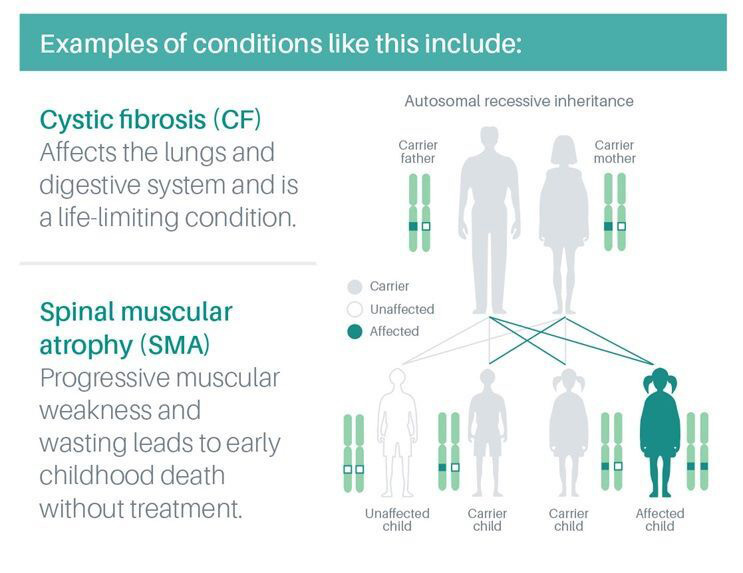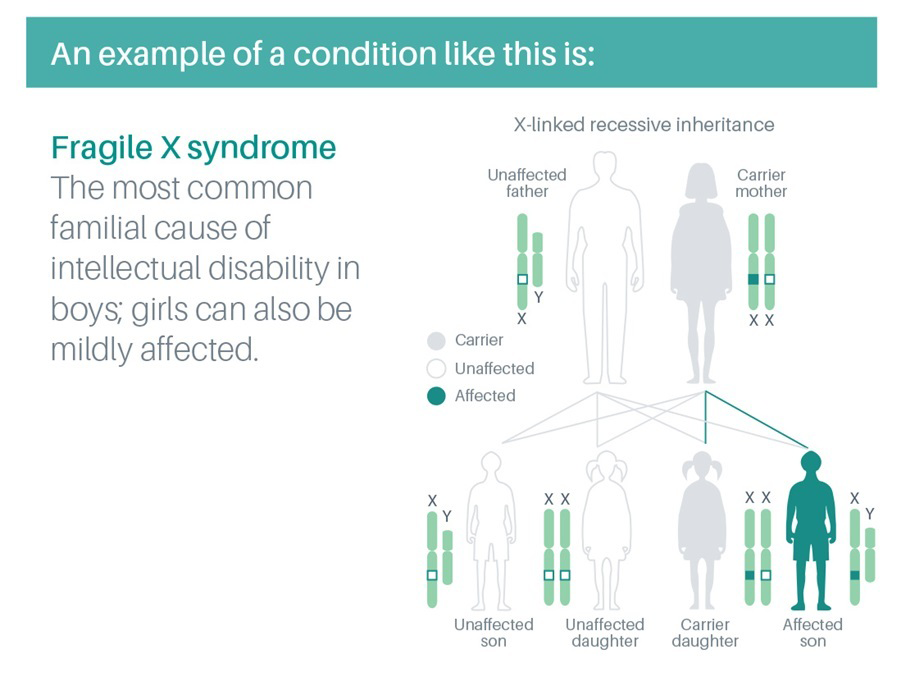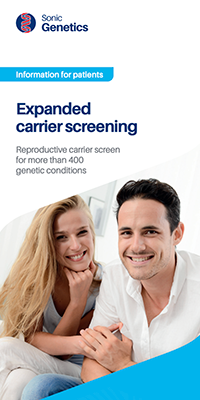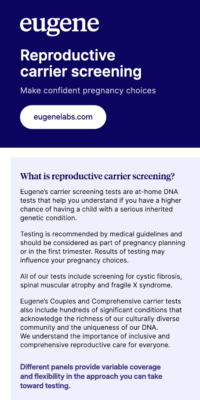Treatments & Services
Reproductive Carrier Screening
Why consider reproductive carrier screening?
If you are thinking about having children, now or in the future, we strongly recommend that you have reproductive carrier screening. Many of us are carriers of recessive genetic conditions and don’t know it. Being a carrier means that you inherited a normal gene from one parent and a gene with an irregularity, also called a mutation, from the other. For recessive conditions, if you have one normal copy of a gene, you typically don’t have any symptoms.
Reproductive carrier screening is a simple saliva or blood test that can determine if you and your partner are carriers of the same condition. If you are, this increases the chance of having an affected child.
Although carrier screening can be done anytime, it is best to be tested before falling pregnant. Your carrier status doesn’t change, so the screening is only required once.
What does carrier screening test for?
Recessive Conditions:
Carriers of recessive conditions are typically healthy and show no signs of the condition. However, if both parents are carriers of the same condition, there’s a one-in-four chance their children could inherit it (see image below). Cystic fibrosis and spinal muscular atrophy are the most common examples of these recessive conditions.

(Image credit: Sonic Genetics)
X-linked conditions:
We can also test for recessive conditions on the X chromosome in females. These have a slightly different inheritance pattern (see the image below). The most common example of this is a condition called fragile X syndrome.

(Image credit: Sonic Genetics)
Reproductive Carrier Screening Panels
We offer three options for reproductive carrier screening:
1. Three-gene panel by Sonic Genetics: Medicare covers this blood test. It screens for the three most common genetic conditions: cystic fibrosis (CF), fragile X syndrome (FXS), and spinal muscular atrophy (SMA). A blood sample is collected and tested from the female partner first. If she is found to be a carrier of CF or SMA, a blood sample can be collected from the male partner. Testing of the male is not required for FXS as this is an X-linked disorder. Around 1 in 200 couples screen positive.
2. The Beacon expanded carrier screen panel by Sonic Genetics: this privately funded test (not covered by Medicare) screens for hundreds of conditions, including the three above. It is pan-ethnic and relevant to people of all ethnicities. Collectively, around 1 in 30 reproductive couples screen positive for a condition.
3. Comprehensive Carrier Screening by Eugene: this is a privately funded test (not covered by Medicare) and is done via an at-home kit using a saliva sample. It tests for over 780 genetic diseases that affect children and is their most comprehensive and inclusive test. Genetic counselling is included in the test price.
If you are having treatment with either donor sperm or donor eggs, you’ll require the expanded panel from Eugene – see our donor section for details.
What is the process for genetic carrier screening?
Carrier screening will be discussed with you at your initial consultation with a Flinders Fertility Doctor and we will provide you with a test request form so that you can get a blood test at a pathology laboratory. Results will be returned to your Doctor and be discussed at your next consultation.
Post-test telephone-based genetic counselling is free-of-charge for couples identified as being at high-risk of having a child affected with an inherited disorder that can cause serious illness. This means both partners must be carriers for the same condition to receive counselling, or the female partner must be a carrier for an X-linked condition.
Alternatively, if you are interested in expanded carrier screening through Eugene our team will guide you on how to order this test via their easy online portal. Remember to opt to share your test results with your treating clinician.
If you will be using donor sperm please refer to our expanded carrier screening for donors.
Fees
The costs for panels are outlined below:
Panel: | Fee: |
Three-gene carrier screen | Free (if Medicare eligible) |
Beacon expanded carrier screen (Sonic Genetics) | $595 |
| Eugene comprehensive carrier screen | $949 or $1499 (couple) |
Carrier Screening FAQs
If you or your partner have a relative with a genetic condition you may have an increased chance of having a child with that genetic condition. Examples of inherited genetic conditions include thalassemia, fragile X syndrome, spinal muscular atrophy, and haemophilia. Some conditions occur more often in certain ethnic groups.
If you have a relative with a genetic condition, you should discuss this with your GP or fertility doctor and they can refer you to a genetic counsellor for further advice and testing.
Carrier screening is relevant to all people planning a pregnancy. Most people who are carriers of a genetic condition do not have a family history of this condition. This is because carriers are typically healthy and because both reproductive partners need to carry the condition to have an increased chance to pass it on. This means that conditions can be passed down through families for many generations before a person is affected by the condition.
The chance of a child being born with a genetic condition varies with ethnicity. As gene technology improves and people are screened for a larger number of conditions it is becoming clear that most people are carriers for one or more inherited conditions. In Caucasian populations, the number of carriers and affected individuals for the most common conditions are:
| Number of Carriers | Number with Conditions | |
| Cystic Fibrosis | 1 in 25 | 1 in 2,500 |
| Fragile-X | 1 in 250 | 1 in 4,000 |
| Spinal Muscular Atrophy | 1 in 40 | 1 in 6,000 - 1 in 10,000 |
(Source RANZCOG 2019)
Private health insurance is not based on a risk assessment of your health. You will not be asked about genetic test results or your family history of health conditions. Most life insurance products such as cover for death, permanent disability, trauma, and income protection are based on a risk assessment (underwritten contracts). Having a genetic condition may impact the cost or terms of the policy. For more details see this FSC factsheet on life insurance and genetic testing.

